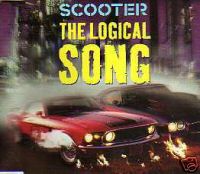The Logical Song
| "The Logical Song" | ||||||||
|---|---|---|---|---|---|---|---|---|
 |
||||||||
| Single by Supertramp | ||||||||
| from the album Breakfast in America | ||||||||
| B-side | "Just Another Nervous Wreck" | |||||||
| Released | April 1979 | |||||||
| Recorded | ||||||||
| Genre | Progressive pop | |||||||
| Length | 4:11 | |||||||
| Label | A&M | |||||||
| Writer(s) | ||||||||
| Producer(s) | Supertramp, Peter Henderson | |||||||
| Supertramp singles chronology | ||||||||
|
||||||||
|
||||||||
| "The Logical Song" | ||||
|---|---|---|---|---|
 |
||||
| Single by Scooter | ||||
| from the album Push the Beat for this Jam (The Singles 98-02) | ||||
| B-side | "Siberia" | |||
| Released | 10 December 2001 (Germany) 10 June 2002 (UK) |
|||
| Genre | Eurodance, hardcore techno, trance | |||
| Length | 3:53 | |||
| Writer(s) | Rick Davies, Roger Hodgson | |||
| Producer(s) | Roger Hodgson | |||
| Scooter singles chronology | ||||
|
||||
"The Logical Song" is a song by the English rock band Supertramp. The song was released as the lead single from their sixth studio album, Breakfast in America (1979), in March 1979 by A&M Records.
"The Logical Song" is Supertramp's biggest chart hit in both the United States, South Africa, and their native United Kingdom and is amongst their most widely recognised radio hits.Roger Hodgson composed the song from an autobiographical point of view, from his experience of being sent away to boarding school for ten years. It won the 1979 Ivor Novello Award for "Best Song Musically and Lyrically".
"The Logical Song" was mostly penned by Roger Hodgson; Rick Davies wrote the vocal harmony on the second chorus. The song makes use of keyboards, castanets, and an instrumental section. Among the contemporary sound effects in this song are the 'tackled' sound from a Mattel electronic football game and the Trouble "Pop-o-matic" bubble – both popular at the time this song was released.
The lyrics are a condemnation of an education system focused on categorical jargon as opposed to knowledge and sensitivity. The lyrics are notable for their use of consonance, with a repetition of the '-ical/ -able' endings of multiple adjectives.
Rolling Stone called the song a "small masterpiece" praising the "hot sax" and Hodgson's "wry humor". The magazine also made comparisons between Hodgson and Ray Davies from The Kinks.
The song was a hit on its original release, reaching number 7 in the United Kingdom and number 6 in the United States. The song also spent two weeks at number 1 on the Canadian RPM Singles Chart, was the top song of the year, and was certified Platinum in Canada. It stayed for three months on the Billboard Hot 100 in the summer of 1979.
...
Wikipedia
